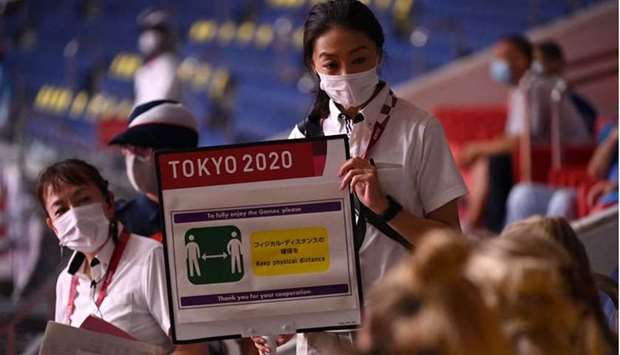Governors of three prefectures near Olympics host Tokyo will ask the government to declare states of emergency for their regions, a cabinet minister said on Wednesday, after Covid-19 infections spiked to a record high in the Japanese capital.
Tokyo recorded 2,848 new cases of coronavirus on Tuesday, the highest since the pandemic began, and media reported authorities had asked hospitals to prepare more beds for patients amid a surge driven by the Delta variant.
The sharp rise in infections may dampen enthusiasm for the Games - taking place under unprecedented conditions, including a ban on spectators in most venues - despite a rush of medals for Japanese athletes.
The surge may also spell trouble for Japanese Prime Minister Yoshihide Suga, whose support ratings are at their lowest since he took office last September, ahead of a general election this year.
Yasutoshi Nishimura, who is leading Japan's Covid-19 response, told a parliamentary panel the prefectures would ask the government to declare the emergency as early as Thursday.
Daily Covid-19 cases were expected to rise further in coming days, as testing may have been delayed during holidays last week, he added.
"I think we have entered a mode of sharp rises in cases, which I had feared the most," Yuji Kuroiwa, governor of Kanagawa prefecture near Tokyo, told reporters. Kanagawa and nearby Chiba and Saitama prefectures are seeing cases jump.
Tokyo is under its fourth state of emergency, which that will last through the Olympics, while the other three regions are implementing looser "quasi-emergency" steps.
Tokyo Olympics organisers on Wednesday reported 16 new Games-related Covid-19 cases, for a total of 169 since July 1. Olympic athletes, staff and media must follow strict rules to prevent the virus's spread, including frequent testing.
"As a city resident myself and as an organiser, my heart hurts that case numbers are rising (in Tokyo)," Tokyo 2020 spokesperson Masa Takaya told a news conference.
He repeated that strict measures were in place inside the "Olympic bubble”. Many Japanese have worried about a spread of infections from Olympics participants.
Suga on Tuesday urged people to stay home as much as possible and watch the Olympics on television. He said cancelling the Games was not an option.
Japan has avoided the devastating outbreaks suffered by other nations such as India, Indonesia and the United States, but the fifth wave of the pandemic is piling pressure on Tokyo's hospitals.
"The risk of infection for individuals is the highest ever. It is affecting even ordinary medical care and ... is a severe situation," Koji Wada, a professor at Tokyo's International University of Health and Welfare and an advisor to the government on Covid-19 response, told NHK public television.
Unlike stricter steps in many countries, Tokyo's current emergency measures focus mainly on asking restaurants that serve alcohol to close and others to shut down by 8 p.m.
Many Japanese have grown weary of the largely voluntary restrictions and some experts say the government decision to go ahead with the Olympics sent a confusing message about the need to stay home, posing a greater risk than direct contagion from Olympic participants.

An IOC volunteer shows a sign to Sweden's delegation members reminding to respect the Covid-19 countermeasures during the men's preliminary round group B handball match between Sweden and Portugal of the Tokyo 2020 Olympic Games at the Yoyogi National Stadium in Tokyo. AFP
